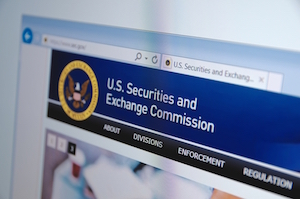 Charles Schwab has agreed to settle claims brought by the SEC that three of its investment adviser subsidiaries failed to disclose and misled clients about alleged hidden fees with respect to its robo-adviser cash fund allocations.
Charles Schwab has agreed to settle claims brought by the SEC that three of its investment adviser subsidiaries failed to disclose and misled clients about alleged hidden fees with respect to its robo-adviser cash fund allocations.
To settle the charges, the subsidiaries agreed to pay $187 million to affected clients, the SEC announced June 13.
According to the SEC’s order, from March 2015 through November 2018, Schwab’s mandated disclosures for its robo-adviser product, Schwab Intelligent Portfolios (SIP), stated that the amount of cash in the robo-adviser portfolios was determined through a “disciplined portfolio construction methodology,” and that the robo-adviser would seek “optimal return[s].”
The SEC contends that Schwab’s own data, instead, showed that under most market conditions, the cash in the portfolios would cause clients to make less money even while taking on the same amount of risk. Schwab advertised the robo-adviser as having neither advisory nor hidden fees, but didn’t tell clients about this “cash drag” on their investment, the SEC notes.
The order explains that, unlike most other robo-advisers, Schwab did not charge an advisory fee to clients for the SIP service. Instead, the firm made money on SIP, in large part, by allocating a fixed percentage of clients’ portfolios to cash and depositing that cash with Schwab Bank. Schwab then profited from the spread that Schwab Bank made by loaning the cash out at higher interest rates than it paid to the SIP clients. Schwab viewed the ability to make money on SIP through the bank deposits as a competitive advantage that most other companies offering robo-advisers could not match because they did not have affiliated banks, according to the SEC.
To offer SIP without charging an advisory fee, Schwab management decided that the SIP portfolios would collectively hold an average of at least 12.5% of their assets in cash. To meet that goal, management set the exact amount of cash in each of SIP’s model portfolios, the order explains, further noting that Schwab’s internal models showed that these pre-set cash allocations would reduce the SIP portfolios’ returns under market conditions where other assets such as equities outperform cash.
“Schwab claimed that the amount of cash in its robo-adviser portfolios was decided by sophisticated economic algorithms meant to optimize its clients’ returns when in reality it was decided by how much money the company wanted to make,” SEC Division of Enforcement Director Gurbir Grewal said in a statement. “Schwab’s conduct was egregious and today’s action sends a clear message to advisers that they need to be transparent with clients about hidden fees and how such fees affect clients’ returns.”
Schwab Responds
A June 13 statement from Schwab says that the firm “neither admits nor denies the allegations” in the SEC’s order and that it is “pleased to put the issue behind us.” Schwab’s statement also points out that the SEC’s order acknowledges that the firm addressed these matters years ago.
“We believe resolving the matter in this way is in the best interests of our clients, company, and stockholders as it allows us to remain focused on helping our clients invest for the future. As always, we are committed to earning our clients’ trust every day and work diligently to maintain the highest standards for professional conduct throughout our organization,” the firm stated.
The statement explains that SIP is a key component of the firm’s advisory lineup and an important way to help clients invest for the future in a diversified way. “We are proud to have built a product that allows investors to elect not to pay an advisory fee in return for allowing us to hold a portion of the proceeds in cash, and we do not hide the fact that our firm generates revenue for the services we provide,” the statement says. It adds that, “We believe that cash is a key component of any sound investment strategy through different market cycles.”
The Settlement
According to the order, the settlement with the SEC involves Schwab Wealth Investment Advisory, Inc., Charles Schwab Investment Advisory, Inc. and Charles Schwab & Co., Inc.
Under the settlement terms, Schwab will pay $186.5 million—$52 million in disgorgement and prejudgment interest and a $135 million civil penalty to resolve the matter. The funds will then be deposited into a Fair Fund account for distribution to affected investors. The subsidiaries also agreed to a cease-and-desist order prohibiting them from violating the antifraud provisions of the Investment Advisers Act of 1940.
Schwab will also retain an independent compliance consultant to review CS&Co.’s and CSIA’s current supervisory, compliance and other policies and procedures concerning CS&Co.’s and CSIA’s SIP-related disclosures, advertising and marketing communications with clients or potential clients.

